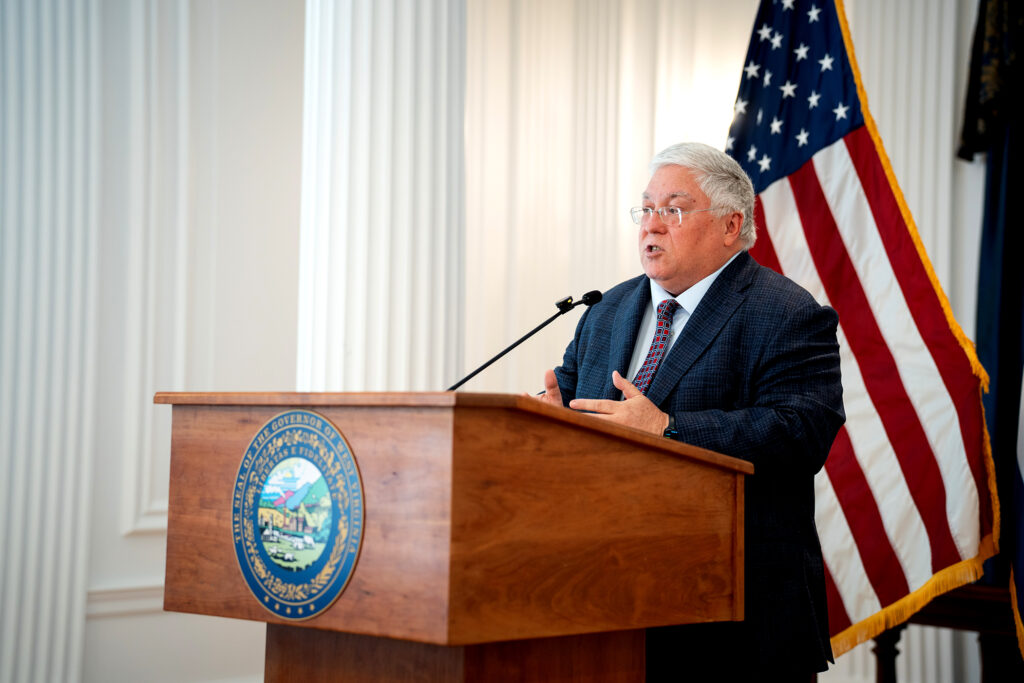With delays to federal nutritional benefits expected, the state government is trying to step up to meet the need and asking for public support, too.
Gov. Patrick Morrisey announced at a press conference Tuesday afternoon, that the U.S. Department of Agriculture (USDA) confirmed over the weekend, that distribution of federal Supplemental Nutrition Assistance Program (SNAP) benefits will at least be delayed in November due to the ongoing shutdown of the federal government.
To address the growing need that has already doubled visits to area food banks and pantries, the governor announced an additional $13 million in available state funds. And Morrisey said he hopes that amount can double by challenging West Virginians to donate.
“Our hope is that through this matching program, we can secure many millions, ideally up to another $13 million from the public, from the private sector and from other organizations,” he said. “When you factor in the $13 million from the state, and you combine it with potentially another $13 million, that’s a lot of resources that we could provide. We need your help. We need you to step forward.”
According to the USDA, almost 300,000 people in West Virginia rely on SNAP benefits, with one third of those recipients being children.
Last week, Morrisey said he was making $1.1 million already appropriated by the West Virginia Legislature available immediately to state food banks, and called on the public to donate to their local food bank.
Tuesday, Morrisey chastised federal Democrats for shutting down the federal government, which he and other Republicans have taken to calling the “Schumer Shutdown.” He claimed Senate Minority Leader Chuck Schumer, D-NY, and other Democrats are, “insisting on free health care for illegals and a $1.5 trillion wish list for demands that have nothing to do with keeping the government open.”
“They’re refusing to come to the table and pass a clean, bipartisan funding extension that would fund the government and ensure these benefits go out to our citizens,” Morrisey said. “Instead, they’re playing politics, and quite frankly, they’re playing politics with a lot of people’s lives. Unfortunately, many West Virginians are being caught in the crossfire.”
About an hour before the governor’s announcement, state Democrats published a letter calling on Morrisey to do more to address growing hunger in the state.
“We need to stand in solidarity and do more for West Virginia,” House of Delegates Democrats wrote. “There are various funds that can be utilized to help address this emergency, and we stand ready to work with you in a special session or through other legislative means to ensure no West Virginian goes hungry.”
West Virginia receives between $45 million and $50 million a month in SNAP benefits, an amount Morrisey has repeatedly stated the state cannot begin to match. Asked whether he would declare a state of emergency, the governor did not rule out the possibility but said he was trying to tackle the situation in phases.
“If we need to come back, we’re going to come back. We just have to continually push to get as many of the private sector resources,” Morrisey said. “It’s an unbelievable challenge when you talk about SNAP benefits. The state of West Virginia can’t just afford to absorb that permanently, right? We know that, but we want to help as much as we can now.”
The governor also directed citizens to the state’s 211 hotline to connect callers to community based resources, and announced the involvement of the West Virginia National Guard to provide logistical support.
Maj. Gen. James Seward said the Guard has a long history of assisting the citizens in time of need.
“We don’t know exactly today where the obstacles will lie in the delivery of food to our citizens, but the National Guard is bringing its service members in on state active duty to be ready to assist, and we’re coordinating with the food banks,” he said. “We will be coordinating with state agencies and local officials to make sure that a mobile food pantry needs to be set up in a community because there is no food pantry that we can assist in making that happen.”
Morrisey and Seward were also joined by House Speaker Roger Hanshaw, R-Clay, who said that the primary jobs of government are infrastructure and public safety.
“Certainly no element of public safety rings more true to citizens, certainly across our state, than food security,” Hanshaw said. “In an environment in which food security is already a baked in problem that we in our communities experience every day, a federal government that has abdicated its responsibility to do basic services and provide basic funding for the functions of government is unacceptable. So today’s decision is the right decision.”























